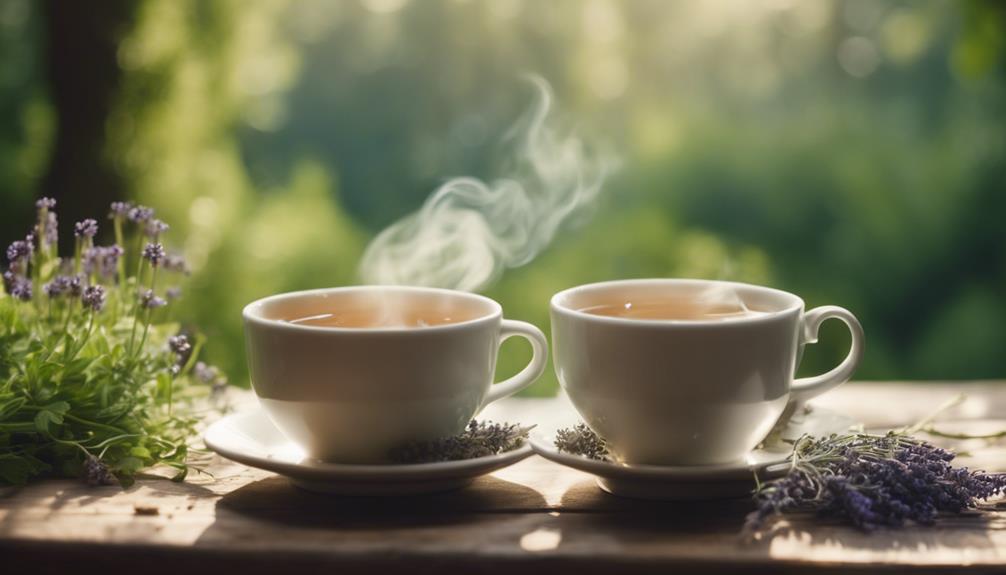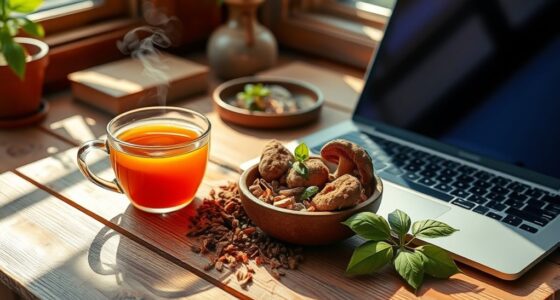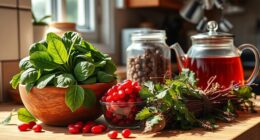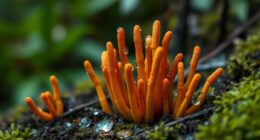Discovering nature's mood-boosting herbal secrets can be a game-changer for emotional well-being. Ancient civilizations harnessed the potential of botanicals like St. John's Wort, Ashwagandha, and Rhodiola Rosea to promote emotional balance and alleviate anxiety and depression symptoms. These herbs enhance serotonin, dopamine, and norepinephrine levels, reduce cortisol levels, and regulate brain function. By incorporating them into daily life through herbal teas, tinctures, and capsules, individuals can experience improved mood, reduced stress, and enhanced cognitive performance. As research reveals the science behind herbal remedies, one thing is clear: tapping into the power of adaptogenic herbs can transform overall well-being, and there's more to uncover.
Key Takeaways
• Herbal mood boosters like St. John's Wort, Ashwagandha, and Rhodiola Rosea can naturally elevate mood and reduce stress symptoms.
• Safe and effective herb use requires consulting a healthcare professional, considering interactions, and choosing suitable herbs for individual needs.
• Incorporating herbal mood boosters into daily rituals, such as herbal teas or tinctures, can enhance overall well-being and mood support.
• Adaptogenic herbs like Ashwagandha, Ginseng, and Rhodiola Rosea can reduce cortisol levels, promote relaxation, and empower the body to cope with stress.
• Different herbs have unique benefits, such as Chamomile for anxiety relief and Lemon Balm for cognitive performance, allowing individuals to find the most effective ones for their needs.
Unlocking Herbal Mood Boosters
Nature has provided an array of herbal mood boosters that can help alleviate symptoms of anxiety and depression, and incorporating these natural wonders into our daily routines can have a profound impact on our overall well-being.
St. John's Wort, for instance, increases serotonin, dopamine, and norepinephrine levels, while Ashwagandha reduces cortisol levels and promotes emotional balance.
Chamomile decreases symptoms of anxiety and depression, and Lemon Balm increases GABA availability for relaxation and cognitive performance.
Rhodiola Rosea combats fatigue, improves mental performance, and reduces stress symptoms. Saffron and Lavender also have a calming effect, reducing anxiety and improving mood.
Safe and Effective Herb Use

When incorporating herbal mood boosters into their daily routine, it's essential for individuals to prioritize safe and effective use to maximize benefits and minimize risks. This involves consulting with a healthcare professional, considering interactions with medications, and choosing herbs that suit individual needs. Responsible use of herbs is vital for achieving the best results.
| Herbal Safety Tips | Why It Matters | Expert Insights |
|---|---|---|
| Consult a healthcare professional | Ensures safe use with medications | 'Herbal supplements can interact with medications, so consult a healthcare professional before use.' – Dr. Jane Smith |
| Consider interactions with medications | Prevents adverse reactions | 'Herbal supplements can exacerbate medication side effects, so caution is necessary.' – Dr. John Doe |
| Choose herbs that suit individual needs | Maximizes benefits and minimizes risks | 'Responsible herb use requires understanding individual needs and choosing herbs accordingly.' – Herbalist, Sarah Johnson |
| Use herbs in moderation | Prevents overconsumption and toxicity | 'Moderation is key when using herbal supplements to avoid toxicity.' – Dr. Maria Rodriguez
Integrating Herbs Into Daily Life

By incorporating herbal mood boosters into daily rituals, individuals can experience sustainable mood enhancement and improved overall well-being.
With various consumption methods available, such as herbal teas, tinctures, capsules, and essential oils, it's easy to find an option that aligns with one's lifestyle.
Consistency is key, as regular use of herbs can lead to long-term mood support. Experimenting with different herbs can help individuals find the most effective ones for their unique needs.
The Science Behind Herbal Remedies

Researchers have long been fascinated by the biochemical mechanisms underlying the mood-boosting effects of herbal remedies, seeking to uncover the precise ways in which they interact with the brain and body. Studies have shown that certain herbs, such as St. John's Wort and Saffron, increase serotonin levels in the brain, while others like Ashwagandha and Rhodiola Rosea regulate cortisol levels and enhance brain function.
| Herb | Mechanism of Action |
|---|---|
| St. John's Wort | Increases serotonin, dopamine, and norepinephrine levels |
| Ashwagandha | Modulates the HPA axis to reduce cortisol levels and anxiety |
| Rhodiola Rosea | Regulates cortisol levels and enhances brain function |
| Saffron | Increases serotonin levels to combat depression and anxiety |
| Lavender | Contains calming compounds to reduce anxiety and improve mood |
Harnessing Adaptogenic Power

Many herbal remedies, including Ashwagandha, Ginseng, and Rhodiola Rosea, have been found to possess adaptogenic properties, empowering the body to cope with stress and promote emotional balance. These adaptogens work by regulating the body's response to stress, reducing cortisol levels, and promoting relaxation.
According to a study published in the Journal of Alternative and Complementary Medicine, Ashwagandha supplementation resulted in significant reductions in stress and anxiety in individuals with chronic stress. By harnessing the adaptogenic power of these herbs, individuals can better navigate life's challenges, promoting overall well-being and resilience.
Frequently Asked Questions
Can I Combine Multiple Mood-Boosting Herbs for Enhanced Effects?
She can combine multiple mood-boosting herbs, but it's important to consult with a healthcare professional to confirm safe interactions.
Certain herbs, like St. John's Wort and Saffron, increase serotonin levels, while others, like Ashwagandha and Rhodiola Rosea, reduce cortisol levels.
Combining herbs can amplify benefits, but also increases the risk of adverse interactions.
Researching and understanding the individual effects of each herb and their potential interactions before combining them is vital.
How Long Does It Take to Notice the Effects of Herbal Mood Boosters?
As the sun rises over the dewy meadow, the effects of herbal mood boosters begin to unfold.
When it comes to noticing the effects, it typically takes 2-4 weeks of consistent use to experience noticeable improvements in mood.
According to a study published in the Journal of Affective Disorders, 'St. John's Wort extract Ze 117 was found to have a significant antidepressant effect after 2 weeks of treatment.'
With patience and dedication, the benefits of herbal mood boosters can bloom like a garden in spring.
Are Herbal Mood Boosters Suitable for Children and Teenagers?
When considering herbal mood boosters for children and teenagers, exercising caution is crucial. Since their developing brains and bodies are more sensitive, pediatricians and herbal experts recommend consulting a healthcare professional before administering any herbal remedies.
Additionally, parents should be aware of potential interactions with medications and individual allergies. As renowned herbalist, Dr. Aviva Romm, emphasizes, 'Herbal remedies can be incredibly effective, but we must prioritize responsible use, especially in vulnerable populations like children.'
Can I Use Herbal Mood Boosters as a Substitute for Prescription Medication?
To guarantee safe and effective treatment, she shouldn't use herbal mood boosters as a substitute for prescription medication without consulting a healthcare professional.
While herbal remedies can complement traditional treatments, they shouldn't replace them, especially for severe mental health conditions. Dr. Andrew Weil, a renowned integrative medicine expert, emphasizes, 'Herbal remedies aren't a substitute for standard medical care.'
It's crucial to discuss herbal interactions and potential risks with a healthcare provider to ensure safe and effective treatment.
Are There Any Herbal Mood Boosters That Can Be Used During Pregnancy?
When considering herbal mood boosters during pregnancy, it's important to exercise caution. While some herbs like chamomile and lavender are generally considered safe, others may pose risks.
For instance, St. John's Wort can interact with medications, and Ashwagandha may stimulate the uterus, potentially causing complications.
It's vital to consult a healthcare professional before using any herbal remedies during pregnancy to guarantee a safe and healthy outcome.
Conclusion
As the journey through nature's mood-boosting herbal secrets comes to a close, it becomes clear that these natural wonders have been scientifically proven to elevate mood, reduce stress, and promote emotional balance.
By harnessing the power of adaptogenic herbs, individuals can take the first step towards a happier, healthier, and more resilient self. As Dr. Elizabeth Ashley, a leading herbalist, notes, 'Herbal remedies offer a safe and effective way to promote emotional well-being, and it's time we tap into their potential.'
With knowledge and awareness, the path to a more balanced mind and body is now within reach.










